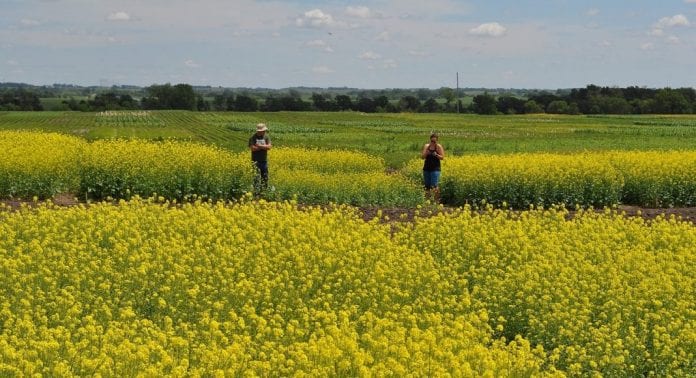By now you’ve likely heard the buzz surrounding the new Christopher Walken movie Percy, which follows a Saskatchewan farmer who takes on a big corporation over patented canola seed.
Percy Schmeiser passed away recently. His role in the Canadian agricultural history books was a prominent one. The story is familiar to many in the seed industry and agriculture in general, so I won’t get into my opinion of the movie. Many have already expressed what they feel are inaccuracies in the film.
Instead, I wanted to take this opportunity to talk a bit about a wider phenomenon that we see every day, which is the public’s misunderstanding of what we do in the seed industry and why the protection of intellectual property is important.
A movie like Percy describes plants as Mother Nature’s gift to humanity that are exploited by industry via patents. In many ways, plants are indeed nature’s gift to us — but when this worldview is taken to an extreme, it misses a crucial fact.
The seeds farmers traditionally used were modified by humans for thousands of years through conventional breeding methods, well before the introduction of GMOs. Today, through modern technology, we are able to develop new and inventive traits and characteristics for seeds, and patents help us do that.
In essence, we can work faster and in a more precise, effective way than Mother Nature can.
Farmers make the choice to purchase a company’s seed technology because they reap the benefits they want and need on their farm. Seeds that are higher yielding, can grow and thrive in different weather and soil conditions, are resistant to diseases, can defend against harmful insects or are tolerant to herbicides that kill destructive weeds, have been game-changing for the industry.
Consumers benefit by getting safe, high-quality food at an affordable price. Farmers are able to produce more, on less land, in a very sustainable way that helps our environment. The ability to patent our inventions and, in turn, charge growers for those innovations, gives us the capital for research and development we need to bring these benefits to consumers and farmers.
The vast majority of farmers do support the value that intellectual property law brings to agriculture. People who aren’t involved in the industry may not as readily accept it because many people don’t realize how high-tech and innovative the industry truly is, or how the technology benefits us as individuals.
The food we consume is personal and sometimes emotional, and we all want to make sure what we put in our bodies is safe, high quality and responsibly produced.
To help build public understanding about the Canadian food system, our industry is collaborating more and more to help spread the word about agriculture and show how technology benefits everyone from the farmer to the end consumer. We are striving to find new ways to tell our story and share our perspective through conversations, social media and other means.
Movies are created as entertainment. Percy is no exception and the movie takes some creative liberties for dramatic effect. Even though it’s based on actual events that happened decades ago, we should take the story with a grain of salt — or a grain of canola, for that matter.
My hope is that when people see agriculture on the big screen, they are inspired to learn more about our industry and how it benefits us all.












